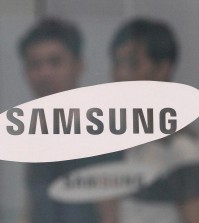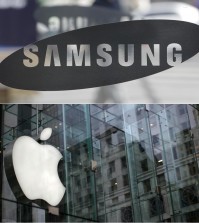- California Assembly OKs highest minimum wage in nation
- S. Korea unveils first graphic cigarette warnings
- US joins with South Korea, Japan in bid to deter North Korea
- LPGA golfer Chun In-gee finally back in action
- S. Korea won’t be top seed in final World Cup qualification round
- US men’s soccer misses 2nd straight Olympics
- US back on track in qualifying with 4-0 win over Guatemala
- High-intensity workout injuries spawn cottage industry
- CDC expands range of Zika mosquitoes into parts of Northeast
- Who knew? ‘The Walking Dead’ is helping families connect
Samsung-Google agree to 10-year deal
By Choi Kyong-ae
Samsung Electronics and Google have signed a 10-year cross-licensing agreement on mobile technology patents in an extended partnership, the Korean company said Monday.
On the same day, it reached a multi-year patent-sharing deal with Ericsson, “ending complaints made by both companies against each other,” according to a statement posted on the web page of the Swedish mobile services operator.
Samsung, the world’s largest mobile-phone maker by sales, stands to gain from the long-term deals as its battle with Apple is escalating in markets and courts worldwide, the company and analysts said.
“The cross license with our partner Google is aimed at avoiding unnecessary competition and seeking mutual growth,” Samsung Electronics Executive Vice President Ahn Seung-ho said in a statement. He also serves as head of Samsung’s Intellectual Property Center.
Currently, most Samsung smartphones run on Google’s Android mobile operating system ― Apple smartphones run on its iOS system. Android claimed a 68 percent share of the global market last year, with iOS accounting for 16 percent, according to market research firm Strategy Analytics.
“By working together on agreements like this, companies can reduce the potential for litigation and focus instead on innovation,” Allen Lo, deputy general counsel for patents at Google, said in a statement.
Analysts said the strengthened partnership between Samsung and Google will definitely generate some synergy as the hardware and software companies are complementary in their strengths and weaknesses.
“Under the patent license deal, Samsung looks set to benefit from Google’s software competitiveness. And Google seems to have chosen the best among a variety of options in order to defend its Android operating system,” NH Securities analyst Lee Sun-tae said by telephone.
The deal will cover not only existing patents owned by the two companies but also those that are expected to be filed over the next 10 years, the statement said without elaborating further on the strategic partnership.
Moreover, Samsung’s partnering with Google has sharply reduced the likelihood that the two companies might be involved in a legal battle over intellectual property in the future, Lee said.
In recent years, Samsung and its archrival Apple have been in court battles over mobile patent infringement in many countries including the U.S. and Korea.
A U.S. federal jury ruled in November that Samsung owed Apple $930 million in damages for patent violations, with a final court ruling for the case due early this year.
“Apple has focused on high-end smartphones. But the company is now diversifying its lineup to low-end products to expand into rapidly-growing markets such as China and India,” Kevin Lee, an analyst at Korea Investment & Securities, said.
Samsung and Apple have been vying for a bigger share of the mobile phone market with the two separate operating systems. They are competing with each other with the Galaxy S4 and the iPhone 5, respectively, in smartphones.
Apple’s revision to its strategy seemingly pressured Samsung and Google to sign the deal on a broad range of mobile technology patents in a bid to jointly cope with Apple’s bigger presence globally, Kevin Lee said.
Still, Google remains a potential competitor of Samsung.
It bought Motorola Mobility in 2011 to provide better phones at lower prices. Motorola Mobility adopted Android open-source software, as the sole operating system for all its smartphone devices, according to Google’s web page.
Meanwhile, the cross license deal between Samsung and Ericsson “includes an initial payment and ongoing royalty payments from Samsung to Ericsson for the term of the new license agreement,” the statement said, noting financial details of the deal are confidential.
Samsung confirmed the settlement of legal disputes and renewal of the patent deal.
The deal covers patents relating to the Global System for Mobile communications, Universal Mobile Telecommunications System, and Long Term Evolution mobile network technology standards for both networks and handsets, the statement said.
















